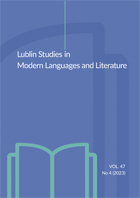Reconsidering Spatial Interaction in the Virtual Literature Classroom after the Pandemic Lockdown
Reconsidering Spatial Interaction in the Virtual Literature Classroom after the Pandemic Lockdown
Author(s): Mustafa Zeki ÇıraklıSubject(s): Health and medicine and law, Distance learning / e-learning
Published by: Wydawnictwo Naukowe Uniwersytetu Marii Curie-Sklodowskiej
Keywords: autoethnography; pandemic era; virtual literature classroom; spatial interaction; postures of human learners;
Summary/Abstract: This paper analyses the qualitative notes of a self-reflective researcher and examines his literature classroom experience. The researcher develops an auto-ethnographical research design to understand how spatial interaction can be experienced after the critical shift from actual settings to virtual settings. The paper elucidates the results in efficiency regarding involvement and creativity. The researcher’s recorded auto-ethnographical entries cover four weeks while teaching at a state-run department in Trabzon. He tries to transform the virtual setting into a spatial learning medium to achieve responsive interaction and creativity to enhance the participants’ critical thinking and imagination. S/he referred to the theory of postromantic education to examine the results. S/he decided to keep a diary about the classroom experience. The reflective account revealed that the use of whiteboards and particularly the integration of chatbox into virtual classrooms helped overcome social and spatial interaction drawbacks. The study concluded that the internally motivated participants oscillate between imagination and cognition thanks to the experiential apparatus of spatial interaction created by the postromantic framework.
Journal: Lublin Studies in Modern Languages and Literature
- Issue Year: 47/2023
- Issue No: 3
- Page Range: 19-29
- Page Count: 11
- Language: English

